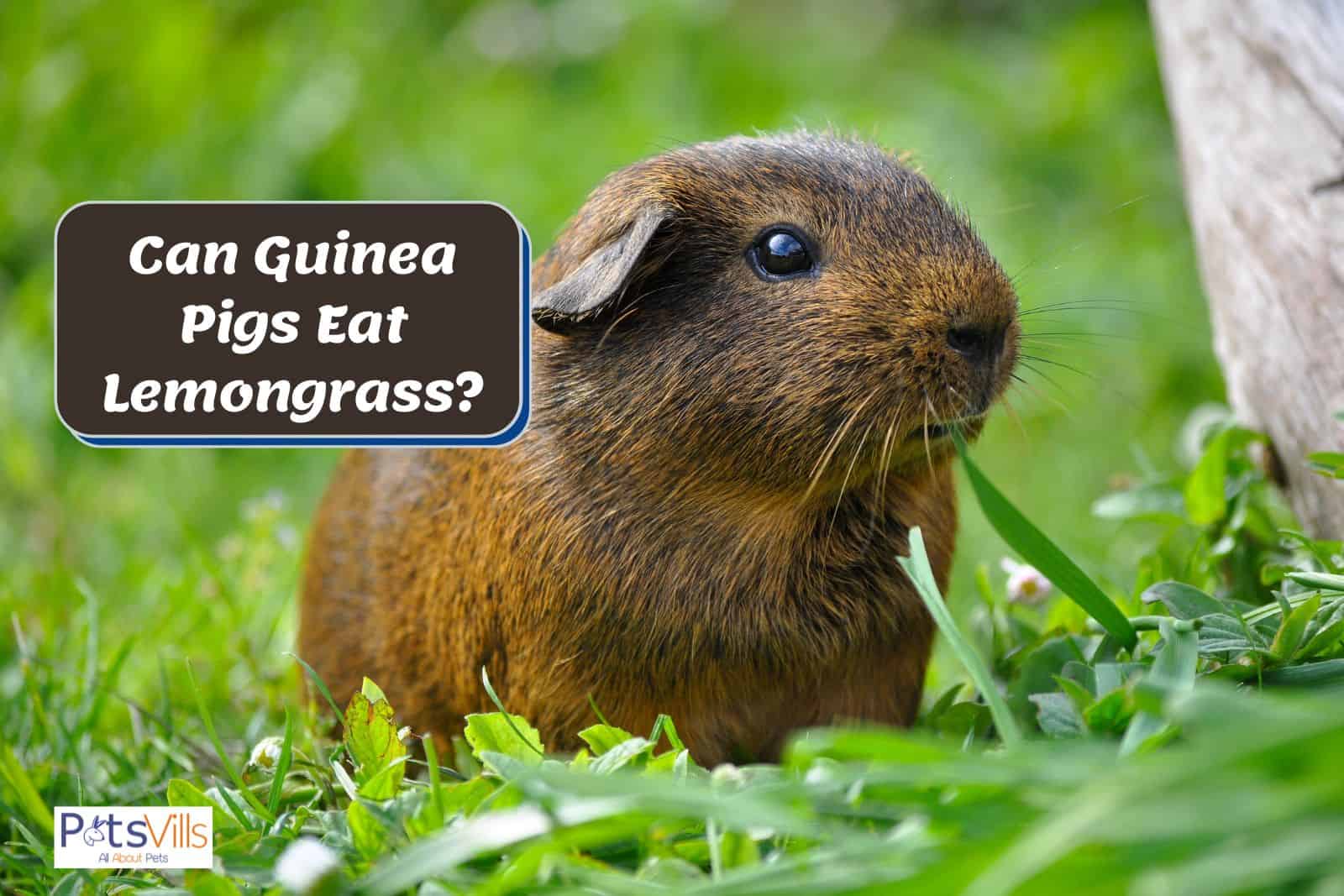Lemongrass is a grass that is widely used in Asian cuisines to add flavoring to soups, stews, and curry. (1)
This fresh grass is safe for humans, but you may have wondered: Can guinea pigs eat lemongrass?
Yes, guineas can eat lemongrass, but only in moderation. Feeding them too much lemongrass could make them sick due to the citronella oils that it contains.
Table of Contents
Is It Safe For Guinea Pigs To Eat Lemongrass?
Lemongrass has many essential nutrients that guineas need, but it can be harmful if they overeat it.
In its live form, lemongrass isn’t harmful to them as long as they eat it in moderation. Lemongrass contains citronella oil which is naturally found in the herb.
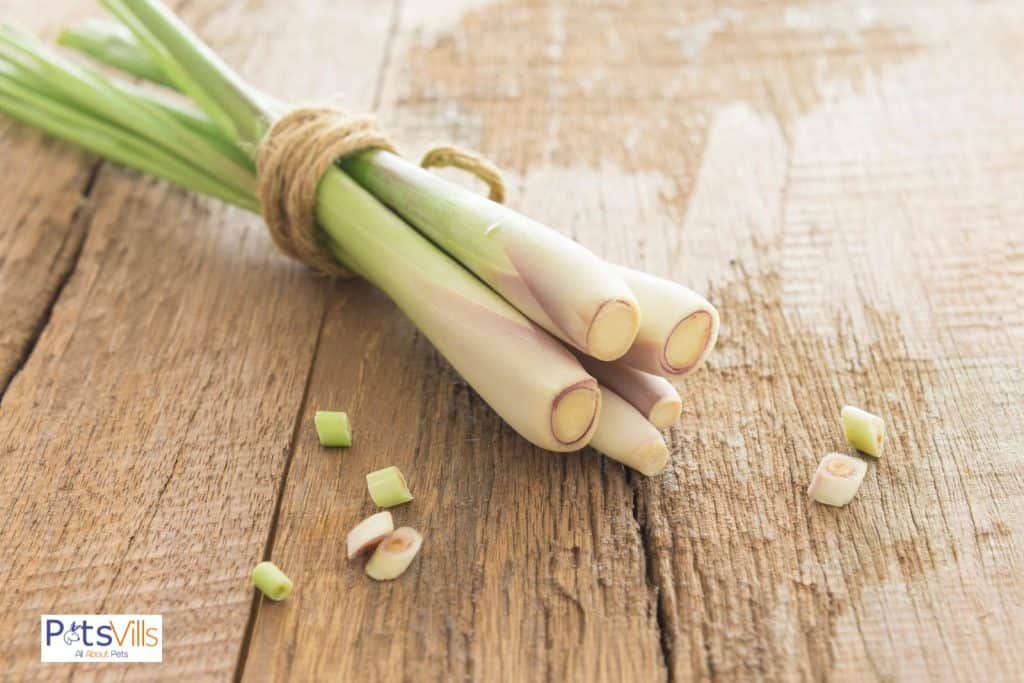
The toxicity level is low; consuming a small amount of lemongrass will not cause any health issues.
However, if guineas ingest a large amount of lemongrass, it can harm them and even lead to death.
Therefore, as a guinea owner, if you want to feed them lemongrass, ensure to feed it to them in moderation.
READ MORE: The 3 Best Food To Feed Guinea Pigs
6 Health Benefits of Lemongrass for Guinea Pigs
Lemongrass has amazing benefits and is a good source of nutrients, including good amounts of vitamin C, as well as B1, B2, B3, B5, B6, and folate.
It also has minerals that include manganese, iron, and calcium. All of these nutrients are great for the health of guineas.
Below are some of the health benefits guinea pigs get from eating lemongrass:
1. Cellular Health
Lemongrass has many antioxidant qualities. Antioxidants are substances that help protect the cells in the body from free radicals. (2)
Free radicals are molecules that are produced naturally in the body during metabolism.
Antioxidants also may contribute to protecting against diseases.
2. Immune System
Lemongrass helps restore vital functions in the body, including digestion, excretion, and respiration.
The result is better absorption of nutrients and strengthening of the immune system.
3. Vitamin C
Lemongrass is a great source of vitamin C. This is important for guineas as they cannot create this vitamin in their body. (3)
They need to obtain it from an outside source to maintain good levels of Vitamin C in their bodies.
Vitamin C is necessary for all body tissues’ growth, development, and repair.
It’s involved in the formation of collagen, absorption of iron, and the proper functioning of the immune system.
Can Guinea Pigs Eat Lemongrass Leaves?
No, you should not feed the lemongrass leaves to your guinea pigs. While the leaves don’t contain any toxins, the leaves are hard for them to chew.
Also, unlike softer grasses, lemongrass leaves are tough and have sharp edges, which could cut their mouths as they chew.
To be safe and prevent any problems, it’s best to cut away the leaves and let them eat only the lemongrass stalk.
How To Feed Lemongrass To Guinea Pigs?
Lemongrass leaves are tough and difficult for guinea pigs to chew. You can cut off the leaves and feed them the stem to make it easier for them to eat the herb. (4)
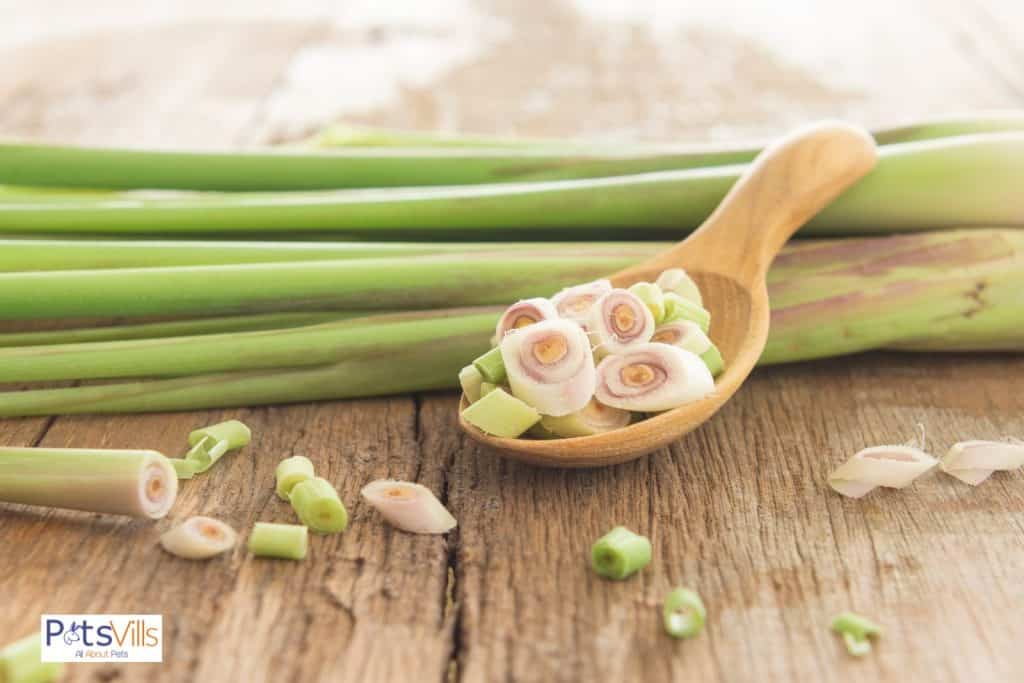
Below are the steps to prepare and feed them lemongrass:
- Start by cutting off the lemongrass’s top leaves and root ends. You will be left with just the stem.
- The rest of the herb should be thrown away as it’s too tough for them to chew on it.
- Peel the outer layer of the herb’s stem until you reach the soft inner part.
- Give this soft part to your guineas to enjoy.
How Much Lemongrass To Feed Guinea Pigs?
While lemongrass plants contain citronella oil, it’s safe to feed it to them in small amounts. This means for adult guinea pigs; you should give them one stalk of lemongrass per week.
Baby guinea pigs should not be given any lemongrass. They are too young, and the herb could be a choking hazard. Also, the lemongrass will be too hard on their digestive system.
How Often To Feed Lemongrass To Guinea Pigs?
Lemongrass should be fed to your guinea pigs in moderation. This means once a week is enough of this herb for them. You don’t want them overeating lemongrass due to its citronella oil.
As long as you feed lemongrass to them only occasionally, you won’t need to worry about it causing any health issues.
READ MORE: Can Guinea Pigs Eat Grass?
Other Herbs That Guinea Pigs Can Eat
1. Thyme
Thyme is an herb that is rich in vitamin C. This vitamin is vital for guineas since their body cannot produce vitamin C. It also has antioxidants, manganese, and vitamin A. Due to its high calcium content, thyme should be fed to them in small amounts a couple of times per week.
2. Dandelion
Dandelion is an excellent source of vitamins A, C, and K. The flowers, stem, and leafy greens can all be fed to guinea pigs. This herb can be served to them either cooked or raw. Feed dandelions in moderation.
3. Basil
Basil is an herb that’s packed with nutrition, especially calcium, vitamin A, and vitamin K. It’s a healthy treat to feed guinea pigs since it’s soft and easy to digest. Due to a large amount of calcium, your guineas should consume no more than a couple of leaves a few times a week.
READ MORE: Can Guinea Pigs Eat Basil Leaves?
FAQs
Does lemongrass have nutritional value for guinea pigs?
Lemongrass plants offer guineas a variety of vitamins and minerals that benefit their immune system and cellular health.
Is lemongrass dangerous for guinea pigs?
In moderation, lemongrass is a healthful treat for them. Too much can make them sick due to the citronella oil it contains.
What should a guinea pig eat daily?
Guinea pigs should eat unlimited amounts of hay in their regular diet, supplemented with hay pellets, fresh leafy greens, and colorful vegetables. Fresh fruits are good, too.
Can guinea pigs eat other types of fresh grass?
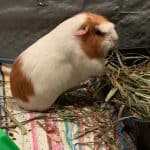
Yes, many types of grass are fine such as the best timothy hay for guinea pigs, as long as the guinea pig grass is introduced slowly and does not replace the dry hay that is crucial for their diet.
Conclusion
The answer to your question, “Can guinea pigs eat lemongrass?” is straightforward: Yes, but in moderation!
Feed them the soft inner center of the lemongrass stalk no more than once per week. Avoid feeding them lemongrass leaves because they are too tough and sharp to chew.
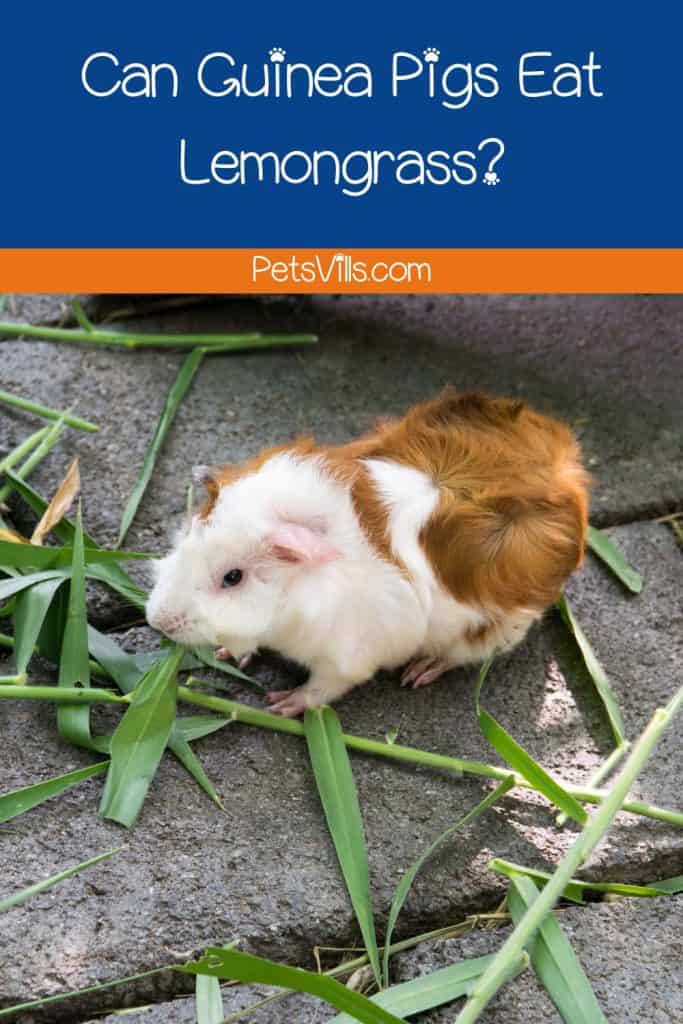
Tell me – have you added lemongrass to your guinea pigs’ diet? Do they love lemongrass at much as mine?!
Resources
- 1. MasterClass. What Is Lemongrass? An Essential Guide to Lemongrass [Internet]. Masterclass Articles. 2021. Available from: https://www.masterclass.com/articles/what-is-lemongrass-an-essential-guide-to-lemongrass
- 2. Harvard School of Public Health. Antioxidants: Beyond the Hype [Internet]. The Nutrition Source. Harvard School of Public Health; 2012. Available from: https://www.hsph.harvard.edu/nutritionsource/antioxidants/
- 3. Hess L, Axelson R. Feeding Guinea Pigs [Internet]. VCA Animal Hospitals. Available from: https://vcahospitals.com/know-your-pet/guinea-pigs-feeding
- 4. Busch S. The Health Benefits and Properties of Lemongrass [Internet]. Healthy Eating | SF Gate. 2018. Available from: https://healthyeating.sfgate.com/health-benefits-properties-lemongrass-3348.html

My name is Ben Roberts, and I absolutely love animals. So, naturally, I love writing about them too! As far as my animals, I have a Pit-bull, a Beagle-lab mix, a Chihuahua, and one old cat. Each one of them provides me with a new adventure every day. And the best part is they’re all best friends. Well, except the cat when he gets a little annoyed.
FIND HIM ON: FACEBOOK and TWITTER.
Read his latest ARTICLES
Learn more about Benhere

